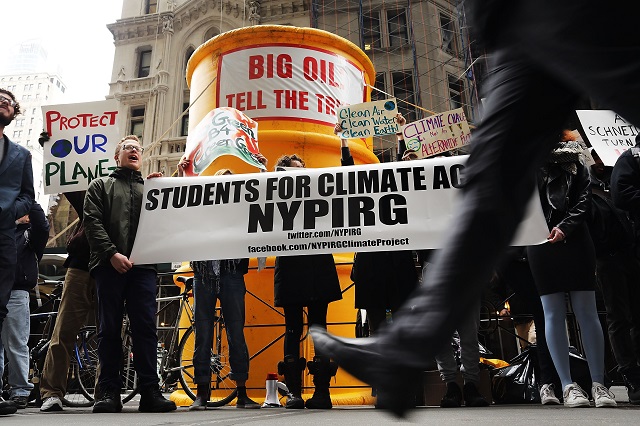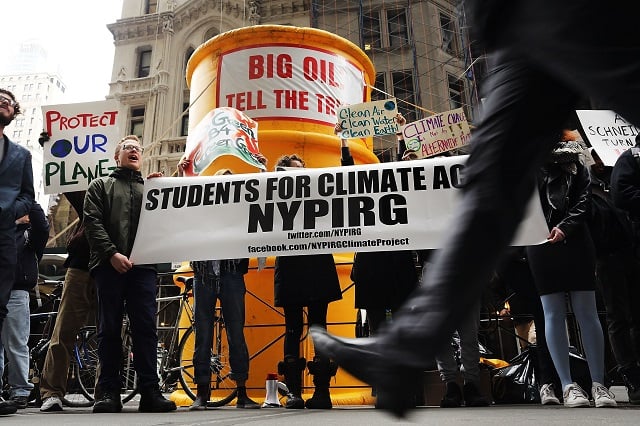
 Activists rally outside of State Attorney General Eric Schneiderman’s office to support the New York state investigation into whether the oil giant Exxon covered up its knowledge about climate change on February 22, 2017, in New York City. (Photo: Spencer Platt / Getty Images)
Activists rally outside of State Attorney General Eric Schneiderman’s office to support the New York state investigation into whether the oil giant Exxon covered up its knowledge about climate change on February 22, 2017, in New York City. (Photo: Spencer Platt / Getty Images)
ExxonMobil executives repeatedly claim their company supports a federal carbon tax and the Paris climate agreement. The company’s checkbook ledger, however, tells a far different story.
Recently, the company released its annual list of its “public information and policy research” grantees, which shows that it spent $1.65 million in 2016 on a dozen think tanks, advocacy groups and associations that contest climate science and oppose both the Paris accord and a carbon tax — the very policies the company professes to endorse. Last year’s outlay boosted the total of the company’s expenditures on climate disinformation over the last two decades to $34.6 million.
Chamber of Horrors
Most of ExxonMobil’s spending on denier groups last year — 87 percent — went to four organizations: the US Chamber of Commerce, American Enterprise Institute, Manhattan Institute and American Legislative Exchange Council.
ExxonMobil gave more than half of last year’s kitty, a cool $1 million, to the Chamber, which provided President Trump with a key, but fraudulent, rationale for pulling out of the Paris agreement. Parroting a recent report funded by the Chamber and the American Council for Capital Formation (ACCF) — which received $1.78 million from ExxonMobil between 2000 and 2015 — Trump claimed that over the next several decades the accord would cost the US economy nearly $3 trillion and, by 2040, eliminate 6.5 million industrial sector jobs.
The Associated Press, Politifact and the Washington Post fact-checked the speech and arrived at similar conclusions: The Chamber and ACCF cooked the books.
“The study makes worst-case assumptions that may inflate the cost of meeting US targets under the Paris accord while largely ignoring the economic benefits to US businesses from building and operating renewable energy projects,” AP reporters Michael Biescker and Paul Wiseman pointed out. “Academic studies have found that increased environmental regulation doesn’t actually have much impact on employment. Jobs lost at polluting companies tend to be offset by new jobs in green technology.”
The Chamber, which has a long history of denying climate science, made similar dire warnings about job losses in a 2014 report analyzing the Obama administration’s Clean Power Plan. That report used flawed assumptions to magnify the carbon rule’s cost and exaggerate job losses and, like its recent report on the Paris agreement, didn’t factor in the carbon rule’s considerable benefits.
The Market Will Take Care of It
The next biggest ExxonMobil grant last year, $235,000, went to the American Enterprise Institute, which had already received $4.1 million from the company between 1998 and 2015. AEI economist Benjamin Zycher addresses climate issues more than anyone else these days at the free-market think tank, and his views are diametrically opposed to ExxonMobil’s professed positions. He disputes the conclusions of mainstream climate science, insists a carbon tax would be “ineffective,” and calls the Paris agreement an “absurdity.”
Zycher’s colleague Mark Thiessen, a former speechwriter for President George W. Bush, is also no fan of the international accord. In a June 2 essay, he cited numbers from the Chamber’s discredited report and maintained that “our emissions will arguably decline faster because of Trump’s withdrawal — because our free market economy will be stronger and more innovative without it.”
Wind Energy Blows
The Manhattan Institute, which received $705,000 from ExxonMobil between 2006 and 2015, pulled in another $135,000 from the company last year. Staffers there aren’t too keen on the carbon tax or the Paris agreement, either. Senior Fellow Oren Cass, who previously worked at Mitt Romney’s old firm Bain & Company, calls the accord a “fraud” and argues that a carbon tax would be “bad for the country” and “bad for the economy.”
Another senior fellow at the libertarian think tank, Robert Bryce, previously worked as a newspaper reporter and for the Institute for Energy Research, a former ExxonMobil grantee that is largely underwritten by the Koch brothers. A self-styled agnostic about climate change, Bryce regularly attacks renewable energy. He especially loves to bash wind, carping about the industry’s temporary federal tax breaks over the last 20 years and its threat to birds. Never mind that the oil and gas industry received an average of $4.86 billion a year (in 2010 dollars) in permanent federal subsidies between 1918 and 2009 (that continue to today), or that oil and gas industry fluid waste pits kill roughly three times more birds a year than wind turbines. Bryce never mentions either of those salient facts.
Not-so-Smart ALEC
Between 2006 and 2015, ExxonMobil gave $600,000 to the American Legislative Council, a secretive lobby group that drafts sample corporate-friendly legislation for state lawmakers. Last year, the oil company gave ALEC another $76,500.
Does ALEC also oppose a carbon tax and the Paris accord? You bet.
In 2013, ALEC drafted a sample resolution for state legislators to reject “all federal and state efforts to establish a carbon tax on fuels for electricity and transportation.” More recently, the director of ALEC’s Energy, Environment and Agriculture Task Force slammed the Paris agreement as a “bad deal” for America. “The Paris agreement is little more than an effort by the previous president to lend some international legitimacy to his destructive regulatory campaign against affordable domestic energy,” Kenneth Stein, a former legislative aide to Sen. Ted Cruz, wrote in May 25 essay on ALEC’s website. “As has been seen in any number of US industries, regulation and rulemaking stifle progress and innovation — much more so when the regulations become part of an international treaty regime.”
Why bother with a carbon tax or an international carbon-reduction agreement if, as ALEC erroneously maintains, scientists haven’t determined the role human activity plays in global warming? “Climate change is a historical phenomenon,” its website states, “and the debate will continue on the significance of natural and anthropogenic contributions.”
More than 100 corporations have quit ALEC for a number of reasons, notably its scientifically indefensible position on climate change. Those companies include a number of energy sector heavyweights, including American Electric Power, BP, ConocoPhillips and Shell. But not ExxonMobil.
Meet the New Boss…
The fact that ExxonMobil’s grantees contradict the company’s avowed positions on climate science and policy should come as no surprise. Its funding pattern in Congress is analogous. Over the years, the company has consistently rewarded legislators who reject mainstream climate science and vote against carbon tax resolutions by funding their reelection campaigns. Half of the nearly $1.45 million it spent on candidates in the 2016 election cycle, for example, went to 81 climate science deniers in the House and 24 in the Senate. And 18 of the 22 senators who sent a letter to President Trump urging him to abandon the Paris agreement collectively received $371,000 in campaign contributions from ExxonMobil between 2011 and 2016.
Rex Tillerson began playing this game soon after he became the company’s CEO in 2006. In January 2007, the Union of Concerned Scientists published a report documenting that between 1998 and 2005, ExxonMobil had spent at least $16 million on a network of more than 40 anti-regulation groups to manufacture doubt about climate science. A week after its release, Tillerson acknowledged that his company had a PR problem. “We recognize that we need to soften our public image,” he said, according to a January 10 story in Greenwire, a trade publication. “It is something we are working on.”
Ten years later, ExxonMobil’s PR offensive continues. Publicly, company officials repeatedly assure the news media and the general public they have seen the light. Climate change is indeed real and we need to address it. At the same time, however, ExxonMobil is still bankrolling climate disinformation groups and deniers in Congress to stymie government action.
In January, Darren Woods, who has been working for ExxonMobil since 1992, replaced Tillerson as CEO. So far, he’s the same as the old boss. His inaugural blog post, which champions natural gas as “powerful tool” to reduce carbon emissions and stresses the challenge of “managing the risks of climate change” while meeting growing worldwide energy demand, could have easily been written by Tillerson. And, like his predecessor, Woods dutifully reiterated ExxonMobil’s nominal support for a revenue-neutral carbon tax and the Paris agreement. But until the company stops funding climate science denier groups and the members of Congress standing in the way, it will remain a major obstacle to saving the planet from the worst consequences of climate change.
Join us in defending the truth before it’s too late
The future of independent journalism is uncertain, and the consequences of losing it are too grave to ignore. We have hours left to raise the $12,0000 still needed to ensure Truthout remains safe, strong, and free. Every dollar raised goes directly toward the costs of producing news you can trust.
Please give what you can — because by supporting us with a tax-deductible donation, you’re not just preserving a source of news, you’re helping to safeguard what’s left of our democracy.